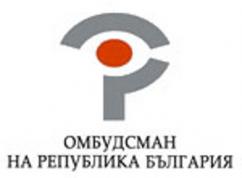News
Ombudsman insists on clear rules to govern immobilization and isolation of mental patients and to allow for such measures only as a last resort

26 February 2024
Ombudsman Diana Kovacheva sent an opinion to Denitsa Sacheva, Chair of the Ad hoc Committee on the Protection of the Rights of Mental Patients, to propose that a medical code of practice be elaborated to give a clear algorithm concerning the application of the forcible measures “immobilization” (restraint, straps) and “isolation”.
Prof. Kovacheva insists that the Ministry of Health should rewrite Regulation 1/28 June 2005 on the procedure for the application of the measures of temporary physical restraint to patients with diagnosed mental disorders for the Regulation as it is conflicts with the UN Convention against Torture and Other Cruel, Inhuman or Degrading Treatment or Punishment and the European Convention for the Prevention of Torture and Inhuman or Degrading Treatment or Punishment of the Council of Europe.
The Ombudsman proposes that the code to the Regulation should prescribe how often patients can be isolated and immobilized within 24 hours, and give the specific reasons for the application of these measures and specify the means of immobilization. Further, the Ombudsman insists on keeping a record of the names and the number of the staff who may be involved in the application of the measures and of the drug therapy applied. She emphasizes that the isolation and immobilization rooms should be supplied with video surveillance and recording equipment and that the footages and soundtracks should be stored for a period of at least three months.
Diana Kovacheva is firm that it is inhuman and humiliating treatment or attitude to keep a patient immobilized and isolated for hours on the same day and recalled the case of 2 October last year when a patient died in an accident at the State Psychiatric Hospital in Lovech.
“The Regulation says nothing to make it clear what is to follow an immobilization (restraint) measure prescribed for two hours. Is it to be understood that five minutes after the measure ceases to apply, the patient can be immobilized again and again, for an unlimited number of times? Then when a patient has been confined to a 6-hour isolation, it is not prescribed how many times this measure can continue for another six hours. Virtually, a patient can be isolated every day in the course of 15 days almost without a break of the measure,” Prof. Kovacheva emphasizes.
Further, the Ombudsman proposes that an integrated information system be developed where each “immobilization” and “isolation” in all psychiatric hospitals in the country will be uploaded in real time. The system in question should connect all psychiatric hospitals for inpatients with the Ministry of Health, which should make public, on a monthly basis, the forcible measures resorted to in the psychiatric hospitals for inpatients in the country.
Another proposal made by Diana Kovacheva is to make it binding on the Committee for the Supervision of the Application of Measures for Temporary Physical Restraint to appoint, as members of the Committee, a person holding a degree in law and a member of a humanitarian NGO and that these two should be free to carry out ongoing inspections on the impositions of temporary physical restraint at any time, round the clock.
The Ministry of Health data show that as of 1 October 2023, the total number of mentally ill inpatients undergoing forced treatment (in state psychiatric hospitals and mental health centers) was 300 and the number of inpatients undergoing mandatory treatment was 1,827 души.
In 2022, forced treatment was applied to 449 patients and mandatory treatment was applied to 2,606 patients, that is, in 2022, a total of 3,055 inpatients received treatment following a court order and were not free to leave the hospitals.
The total number of registered immobilizations as of 1 October 2023 was 1,873, whereas in 2022 it was 2,464.
The conclusion is that the number of inpatients who receive treatment following a court order is large and as they are not free to leave the hospitals, this further obliges the government to strictly monitor the respect of their rights.
Another important proposal made by the Ombudsman is that the Health Act, Chapter V “Mental Health” should vest the prosecution authorities with the power to exercise regular control on all medical facilities for inpatient psychiatric treatment in the country. Persons who died in medical facilities for inpatient psychiatric treatment shall be subject to a post-mortem examination including a chemical and toxicological analysis.
Statistics show that as of 1 October 2023 the total number of post-mortem examinations performed to determine the causes of the death were four. In 2022 they numbered six, and in 2021 – eight.
“I want to note that the youngest patient who died in 2021 at the State Psychiatric Hospital in Sevlievo was 22 years old. The analysis of the causes of death as delivered to me by the Ministry of Health gives cardiovascular insufficiency as the main diagnosis the dead patient,” Prof. Kovacheva writes.


